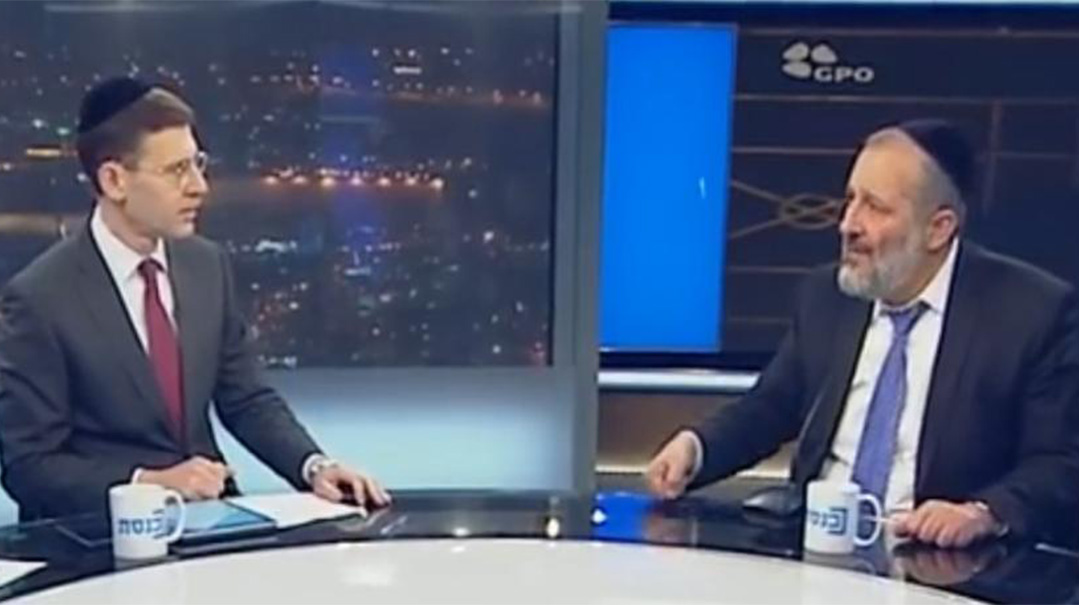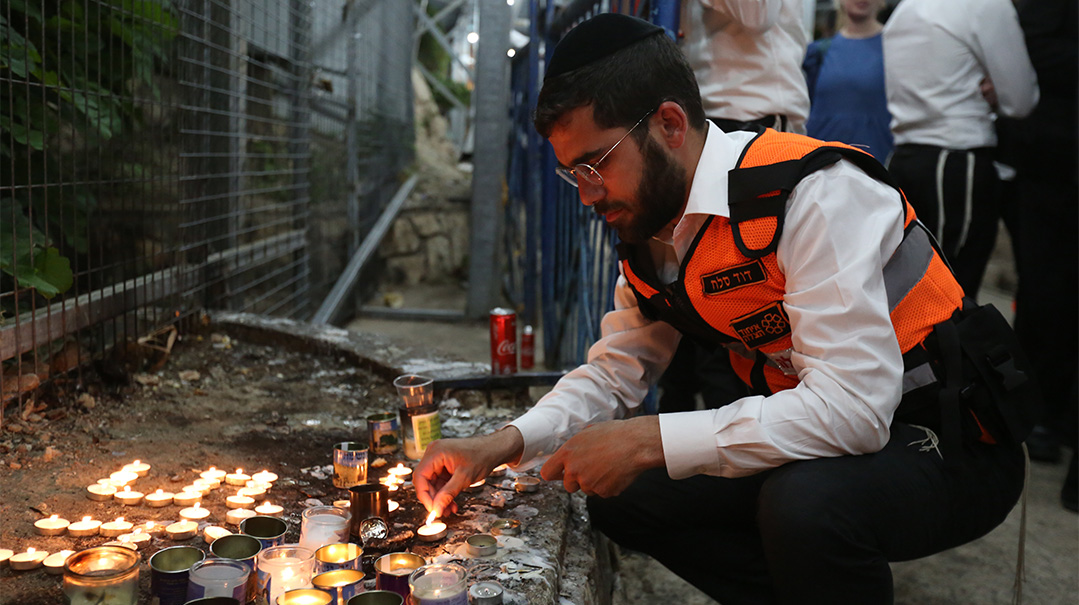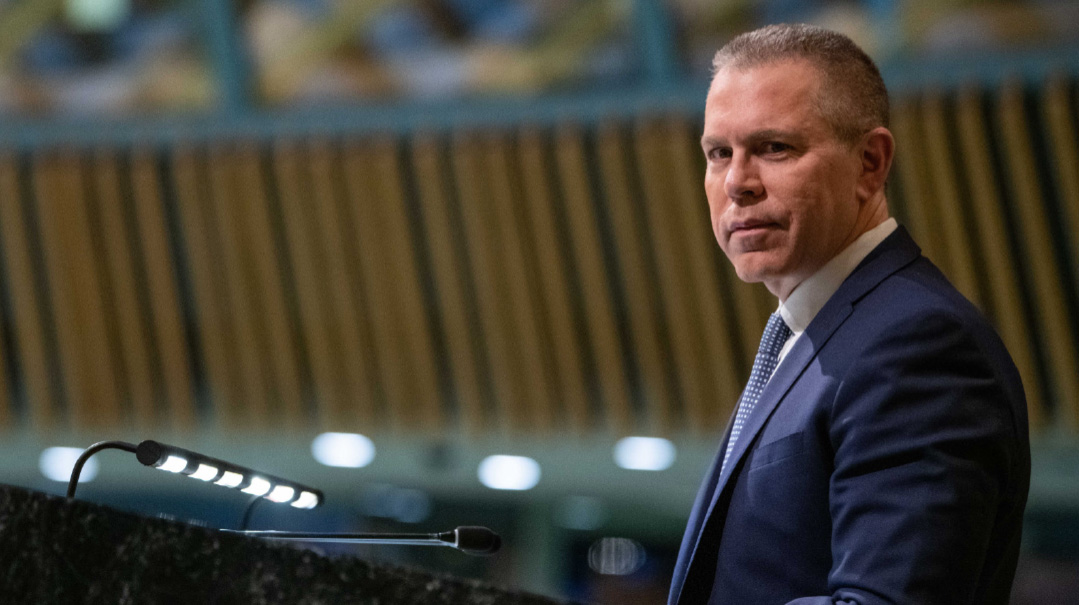Right of Way

Aryeh Deri on why Shas continues to back Bibi

I
sraeli elections are almost upon us again, which means Aryeh Deri’s face is suddenly staring down from billboards up and down the country. Campaigning in the country’s fifth elections in three years, the Shas leader has steered his party back to its social justice roots, emphasizing the cost of living crisis under the slogan “Starving for Change.”
It’s been years since Israel was hit by such a tsunami of crises. A new Iran deal is on the verge of being signed, to the despair of a weak Israeli government. The worldwide economic crisis has driven up prices around the globe, but in Israel that surge comes on top of the new taxes imposed by the government on vulnerable populations. This cocktail is making life in the Jewish state harder than ever. Deri’s personal situation was complicated further by the charge that he bore some culpability for last year’s Meron disaster that claimed 45 lives on his watch as interior minister.
And in the middle of all this, Shas as a movement and Deri, both as its leader and as an individual, have had to deal with the sudden petirah of the nasi of Shas’s Moetzet Chachmei HaTorah, Chacham Shalom Cohen ztz”l. His abrupt passing left the chareidi community in shock, and the Shas movement, for the first time since its founding, without a clear spiritual leader — in the middle of an election campaign.
Two months before the polls open, we sat down with one of the heavyweights of Israeli politics to discuss Meron — a chareidi tragedy about which chareidi politicians have been reticent — as well as Shas’s unwavering support for Netanyahu, and the million-dollar question: Does Bibi have what it takes to get back into power again?
We opened the discussion on Shas’s campaign, which focuses on the plight of the lower socioeconomic stratum in general rather than that of the chareidi community specifically. Deri has called Shas “the only compassionate party in Israel,” and his biggest target is Finance Minister Avigdor Lieberman, once a good friend, now a bitter enemy — personally and politically.
Readers abroad seeing your message might ask themselves, what does Aryeh Deri want from the government? This is a worldwide crisis, and in some Western countries, the situation is even worse. By the way, this is also what your former friend the finance minister is saying.
“I’m glad you got in ‘former friend.’ Lieberman is the one who fueled the fire. When the cost of living wasn’t even an issue in the rest of the world, here in Israel the government came out with a completely unnecessary, cruel, cynical tax, to hurt vulnerable populations, the chareidim, and families with many children. On its first day, this government imposed a tax on disposable silverware, on soft drinks. And this at a time when there wasn’t a shadow of a financial crisis in the rest of the world. The finance minister gave all the big corporations in Israel an idea: If the government of Israel can execute a U-turn, reverse a decade-long economic policy and raise taxes, why shouldn’t we jack up prices as well?”
The government may have contributed to the rising prices, but it’s clear this is a global crisis, not a local one. So why the demagoguery?
“Demagoguery? There’s nothing more genuine and heartfelt than what I said. And the main problem is the lack of empathy.
“Israel has tens of billions of shekels in surplus tax revenue, and we saw how the government was able to find tens of billions for the Arab parties. As interior minister during the coronavirus pandemic, I handed out food stamps to hundreds of thousands of families. This government has abandoned Israel’s vulnerable populations.
“In the US, the administration is pulling up its sleeves to help. Just this week, the UK announced a monthly grant for families to help them manage rising prices. And here in Israel, the homeland of the Jewish People, the people who taught the world the meaning of morality and compassion, we’re turning a blind eye to poverty. This government has nothing but contempt for struggling families, and the finance minister is targeting them specifically. Kids are going to school hungry. This government isn’t just bad, it’s completely heartless.”

Optimism for UTJ
E
ven as calls mount within the United Torah Judaism party for a split between Degel HaTorah and Agudas Yisrael, Shas and the Likud are cooperating so closely they might as well be running a joint slate.
Apropos UTJ’s internecine warfare: unlike Netanyahu, who expressed pessimism this week, Deri is cautiously optimistic that despite the bad blood, Degel HaTorah and Agudas Yisrael will end running a united slate once again.
“If I’m wrong, and they end up running separately,” says Deri, “then so much for all our hard work. One or both parties will fail to cross the threshold, and the right-wing bloc will remain in opposition for another Knesset.”
And back to Deri’s relations with Netanyahu: Sometimes the briefest remark reveals more than a long-winded monologue. I started asking Deri about his meeting with at Netanyahu’s office in Metzudat Ze’ev last week, and he corrected me instantly with a telling answer: “It’s true that we met this week, and not just once…”
Deri has become Bibi’s biggest defender, blocking every attempt to undermine Netanyahu’s leadership of the opposition over the past two years, with his own body. Over the past year, from the opposition, Deri formulated a strategy of unusual cooperation between the right-wing bloc and the Arab Joint List Party, with the common aim of toppling the Bennett-Lapid government.
The big test is still lies ahead, hinging on whether the right led by Netanyahu — on whom Deri has bet his last penny — can finally pull off a win, after four paralyzing draws.
The chareidim under your leadership are sticking with Netanyahu through thick and thin. In several of the campaigns over the last three years, Bibi featured on your campaign posters. You’ve put your database of potential voters at the disposal of the Likud, a political move unprecedented in Western politics, and the public is wondering — what’s behind this devotion? Has Netanyahu become a political “maran,” so to speak?
“The comparison is inappropriate, so rephrase that. Maybe the public wondered that before, but no one wonders anymore. Everyone understands that during the year the previous government was in power, and even now as Yair Lapid sits in the prime minister’s office, the State of Israel has sunk to new depths in every area: the economy, security, diplomacy, and also Jewish identity. Just look at how this government tried to destroy all Yiddishkeit in Israel.”
Some will counter that this is largely propaganda. At the end of the day, no chareidi in Israel can say that the government is preventing him from living according to his values, so what’s all the noise about?
“You’re asking that, but you know the answer yourself. Of course harm was done, to every Jew. The finance minister, with full backing from his colleagues, set out to destroy the chareidi education system and harm chareidi children. Actually, there’s no area in which they didn’t try to hurt us, and b’siyata d’Shmaya we were able to stop them in most cases.
“But let’s talk about the Jewish identity of the country in general, which concerns every Jew with a spark of connection to religion. There has never been a government so damaging to Jewish identity, with reforms aimed at undermining the very concept of kashrus in Israel; with an initiative to recognize tens of thousands of total non-Jews; with blows to the standing of municipal rabbis, whom the government trampled and ground into the dirt, while raising up the Reform.”
Yelling “Reform” to frighten chareidi readers in Israel and especially abroad is a trick that always works…
“This isn’t a game to win votes. This is a genuine cry from the heart based on a horrifying reality, and I’m sure that Mishpacha readers in chutz l’Aretz fully understand the threat posed by the Reform movement to the continued existence of the Jewish People, no less. This government has celebrated them, amplified them, tried to turn them from a marginal movement into a central stream of Judaism in Israel, just like — if not more than — in America. I remind you how one week before we succeeded in bringing down the government, its ministers gathered in the Knesset with the Reform and celebrated together with unbounded chutzpah.”
You’ve explained why the chareidim stick with the Likud instead of playing at king-making, but let’s return to the real point: What’s with all the personal devotion to Netanyahu? Does the right wing not have any other leader who can break the deadlock and end Israel’s political chaos?
“Netanyahu currently represents the religious, traditional, cultural right, which we’re a part of, and we’ll never be dictated to by the destructive progressive left, which wants to root out everything, and not only in Israel.
“But you know what? We talked about Judaism, we talked about the economy, but pikuach nefesh comes first. And I’m telling you as someone who sat in the security cabinet for many years that Israel needs Netanyahu’s leadership. He’s not perfect, but there’s one thing no one can take from him, and that’s his sense of mission for protecting Israel, and the depth of his knowledge and experience. Today, may Hashem have mercy on us, Israel is led by vapid leaders who are a danger to our security.”
You’re a person who chooses his words carefully. You’ve sat in the cabinet under prime ministers from the right and left, you served in the governments of Shamir and Rabin as well as Netanyahu, and were considered a moderate and moderating figure. We’ve never heard such words from you, calling a prime minister a “danger to national security.” Aren’t you exaggerating? Shouldn’t a public figure be trying to tone things down?
“Believe me that, given the reality, I’m speaking with great restraint. We need a lot of siyata d’Shmaya, but that’s the only way to describe it. This is a dangerous and irresponsible government — Bennett first and definitely Lapid now don’t have what it takes to deal with the Iranian threat. They’re clueless and utterly lacking in talent. Sadly, we see where things are going.”
It’s very easy to point to the anticipated deal between Iran and the international community while ignoring the fact that the US has a new administration. We all remember Bibi’s luck with the Obama administration in 2015…
“I’m aware of the circumstances. Biden is not Trump. Clearly, if Trump had stayed on for another term, we would be in a completely different place. Sadly, Biden has loosened the chokehold, and the Iranians realized leis din v’leis dayan, that there’s no law and no judge.
“But the Israeli government’s weak response under these circumstances is taking us to the brink of disaster. We saw how Bibi waged a battle with Obama over public opinion, and now we see the feeble, do-nothing attitude of the current prime minister, sitting and waiting for the US president to return his call and mouth meaningless courtesies after two weeks of keeping him on hold. We see the prime minister’s inaction and weep. Our enemies see it and rejoice.”

Blameless for Meron
O
ur interview is taking place after the nonpartisan commission of inquiry on last year’s Lag B’omer disaster at Meron sent out warning letters to former prime minister Netanyahu, former public security minister Amir Ohana, and senior police officials. One name conspicuously absent from the list — to the surprise of many legal and political analysts — is former interior minister Aryeh Deri.
Deri was interior minister at the time of the disaster, and was seen as the animating force behind reopening the mountain for Lag B’omer, after a year of closure during the pandemic, but the members of the commission of inquiry were convinced by his testimony. They were satisfied that his involvement was limited to enforcing measures against the pandemic, and that he was not made aware of the safety issues which led to the disaster.
There are bereaved parents abroad as well as in Israel who will read the response of a senior government official. They sent their children to this country and lost their most precious assets. What can you tell them, as a member of the government on whose watch this occurred? What happened to collective responsibility, and why didn’t you yourselves found a commission of inquiry?
“It’s not true that we opposed the founding of a commission of inquiry, and you can look into that, but first we have to start with the most important thing — and we must never forget this: This was a terrible disaster, an act of G-d that robbed us of 45 pure and holy neshamos. I have a decades-long acquaintance with a number of these families, and there are also those who sent their children here from chutz l’Aretz, and our hearts ache with theirs. This was an overwhelming tragedy, and none of the commission’s conclusions or warnings will restore to the bereaved families a millionth of what they lost. Having said that, there’s no question that we must do everything to prevent this from ever happening again, chalilah.”
For all that, you initially opposed the forming of a commission of inquiry — and I know your answer in advance. You expressed concern at the time that a state commission of inquiry would focus on finding scapegoats rather than on improving public safety. Today, do you feel that your fears have come true?
“It’s too early to pass judgment, and I hope and believe that the commission will do its job faithfully. When I finished my testimony to the commission, I wanted to get one final important message across. I told the commission members, ‘You have a historic mission. You have it in your power to do what no previous government could do — and I’m not assigning blame, because it required historic changes, both legally and in terms of ownership of the site, investing millions in renovations and evicting the owners — but you can do just that, and I beg you in the name of the public, be bold and don’t hesitate to act.’ ”
The government decided to nationalize the site years ago [in 2011], only for the High Court to bring the process to a halt. Don’t you think the court should also have to answer to the commission?
“Those who received letters of warning have talented attorneys, and I’m sure they’ll raise this point. In my testimony, I tried to shed light on what happened. I stood there for hours, I didn’t dodge a single question, I answered everything in detail, and the commission decided what it decided.”
Prime Minister Netanyahu — who, unlike you, was put on warning — claimed that the commission had marked him as a scapegoat in advance. Do you agree that the commission acted from political motives?
“I don’t want to enter into that. My view is that one should be professional, present the facts, help the commission get to the truth, and most importantly, help it reach the right conclusions to prevent the next disaster. I don’t think it’s necessary to enter into this blame game. A terrible tragedy occurred here, and I still hope the commission will do its job faithfully, and settle the situation on the mountain, and not focus purely on finding scapegoats.”
Turning back to the upcoming election: Shas’s teshuvah gathering in Elul was a centerpiece of campaigns going back to the days of Rav Ovadiah ztz”l. Now you’re facing an election without any spiritual leadership.
“The Moetzet Chachmei HaTorah continues to guide our steps, but I’ll tell you something amazing and moving that I heard at the shivah. In the last period of his life, Chacham Shalom Cohen lived with his daughter in the neighborhood of Ramot, Jerusalem, and every Shabbos night he would deliver an intense shiur. The last time he spoke before being hospitalized, it was Shabbos Chazon. In that talk, to everyone’s surprise, he spoke in tears about the elections. He said that last time we weren’t attentive to kevod Shamayim, and that’s why a government of shmad arose, and that Hashem was doing us a chesed by allowing us to be mekadesh Sheim Shamayim in the upcoming elections. No one understood why he raised the subject so early. He usually spoke about the election on Shabbos night a week or two before the date, but not three months. At the end of the day, that was the will he left us, and we’ll be guided by its light.”
(Originally featured in Mishpacha, Issue 927)
Oops! We could not locate your form.







